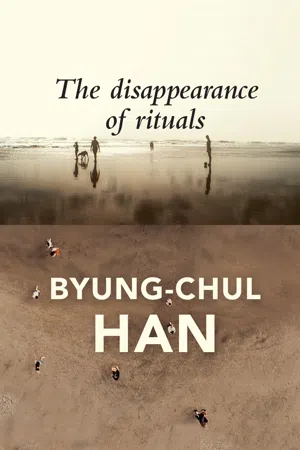
- English
- ePUB (mobile friendly)
- Available on iOS & Android
About this book
Untrammelled neoliberalism and the inexorable force of production have produced a 21st century crisis of community: a narcissistic cult of authenticity and mass turning-inward are among the pathologies engendered by it. We are individuals afloat in an atomised society, where the loss of the symbolic structures inherent in ritual behaviour has led to overdependence on the contingent to steer identity. Avoiding saccharine nostalgia for the rituals of the past, Han provides a genealogy of their disappearance as a means of diagnosing the pathologies of the present. He juxtaposes a community without communication – where the intensity of togetherness in silent recognition provides structure and meaning – to today's communication without community, which does away with collective feelings and leaves individuals exposed to exploitation and manipulation by neoliberal psycho-politics. The community that is invoked everywhere today is an atrophied and commoditized community that lacks the symbolic power to bind people together. For Han, it is only the mutual praxis of recognition borne by the ritualistic sharing of the symbolic between members of a community which creates the footholds of objectivity allowing us to make sense of time. This new book by one of the most creative cultural theorists writing today will be of interest to a wide readership.
Frequently asked questions
- Essential is ideal for learners and professionals who enjoy exploring a wide range of subjects. Access the Essential Library with 800,000+ trusted titles and best-sellers across business, personal growth, and the humanities. Includes unlimited reading time and Standard Read Aloud voice.
- Complete: Perfect for advanced learners and researchers needing full, unrestricted access. Unlock 1.4M+ books across hundreds of subjects, including academic and specialized titles. The Complete Plan also includes advanced features like Premium Read Aloud and Research Assistant.
Please note we cannot support devices running on iOS 13 and Android 7 or earlier. Learn more about using the app.
Information
1
The Compulsion of Production
But what is recognition? It is surely not merely a question of seeing something for the second time. Nor does it imply a whole series of encounters. Recognition means knowing something as that with which we are already acquainted. The unique process by which man ‘makes himself at home in the world’, to use a Hegelian phrase, is constituted by the fact that every act of recognition of something has already been liberated from our first contingent apprehension of it and is then raised into ideality. This is something that we are all familiar with. Recognition always implies that we have come to know something more authentically than we were able to do when caught up in our first encounter with it. Recognition elicits the permanent from the transient.1
And our immemorial rites are in Time what the dwelling is in Space. For it is well that the years should not seem to wear us away and disperse us like a handful of sand; rather they should fulfill us. It is meet that Time should be a building-up. Thus I go from one feast day to another, from anniversary to anniversary, from harvestide to harvestide as, when a child, I made my way from the Hall of Council to the rest room within my father’s palace, where every footstep had a meaning.2
Mass teaches the priests to handle things in beautiful ways: the gentle holding of the chalice and the Host, the slow cleaning of the receptacles, the turning of the book’s pages. And the result of the beautiful handling of things: a spirit-lifting gaiety.4
One of the gravest problems of our day is the lack of commitment to common symbols…. If it were merely a matter of our fragmentation into small groups, each committed to its proper symbolic forms, the case would be simple to understand. But more mysterious is a widespread, explicit rejection of rituals as such. Ritual has become a bad word signifying empty conform...
Table of contents
- Cover
- Title Page
- Copyright
- Preliminary Remark
- 1. The Compulsion of Production
- 2. The Compulsion of Authenticity
- 3. Rituals of Closure
- 4. Festivals and Religion
- 5. A Game of Life and Death
- 6. The End of History
- 7. The Empire of Signs
- 8. From Duelling to Drone Wars
- 9. From Myth to Dataism
- 10. From Seduction to Porn
- Bibliography
- End User License Agreement